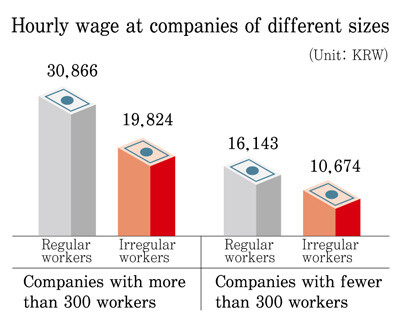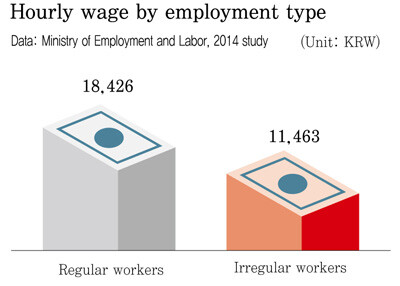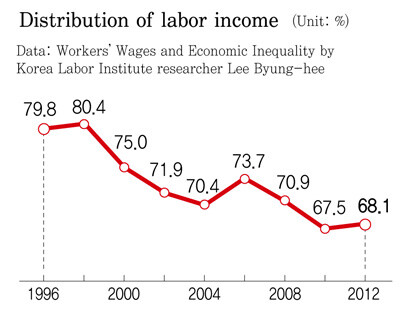hankyoreh
Links to other country sites 다른 나라 사이트 링크
Workers setting up strategies to narrow gap between regular and irregular positions

Inside the labor movement, there are signs of a push for a strategy of solidarity to reduce the gap in wages and working conditions between regular and irregular workers, and between workers at chaebol, or family-run conglomerates, and the smaller companies that serve as their subcontractors. This strategy includes such measures as labor unions for regular workers accepting a lower raise in wages in exchange for improved conditions for irregular workers and creating a fund to provide irregular workers with assistance.

As labor unions centered on regular workers take action to find solutions to the gradually increasing gap in wages between these groups of workers, labor activists are watching closely to see whether these efforts will bear fruit.
According to interviews on Apr. 3 with various sources at the Korea Health and Medical Workers’ Union (KHMU), which is affiliated with the umbrella group Korean Confederation of Trade Unions (KCTU), the KHMU is currently considering the option of diverting part of this year‘s wage increase into converting irregular workers into regular workers and into improving the working conditions of irregular workers.

“Considering that the MERS outbreak last year made clear that the shortage of nurses and other medical staff threatens patients’ right to health and labor conditions for union members, the union intends to back up its request for employers’ to hire on a substantial number of new workers by lending a hand,” said Lee Ju-ho, chief of the KHMU’s strategy and planning team.
“We have prepared a number of measures for industry-wide bargaining this year, including adding to payrolls by converting irregular workers into regular workers. We will be submitting these as motions at the delegate congress at the beginning of next month,” Lee also said.
The KHMU was praised for reaching a “beautiful agreement” in 2007, when it asked for about 30% of the wage increase to which management had already agreed to be used to convert 2,400 irregular workers into regular workers and to address discrimination against about 5,500 other irregular workers.
At the same time, regular workers at the Kia Motors branch of the Korean Metal Workers’ Union are considering the idea of setting up a fund for the benefit of irregular workers, including in-house subcontract workers.
“We are reviewing a plan whereby the union would take the lead in setting up a fund that union members could contribute to in order to improve working conditions for irregular workers in the areas of sales and repairs,” said Song Seong-ho, deputy director of the union’s Kia Motors branch. “Our goal is to pass a motion for this plan in the extraordinary delegate conference that is supposed to take place at the beginning of next month.”
“The biggest obstacle that is currently holding back the labor movement and blocking unity among workers as a whole is the wage gap resulting from the segmentation of the labor market between huge corporations and small companies, between regular workers and irregular workers and between men and women,” said Lee Byeong-hun, a sociology professor at Chung-Ang University. “In order to overcome such segmentation, the labor union needs to develop a solidarity strategy.”
“Unions of regular workers need to proactively adopt a strategy of solidarity. Instead of a wage raise, they should ask employers and the government to raise employment insurance premiums to increase the allowance for job seekers. They should also ask for systemic improvements that would increase the percentage of irregular workers who are enrolled in labor unions,” said No Gwang-pyo, director of the Korea Labor and Society Institute.
By Jeon Jong-hwi, staff reporter
Please direct questions or comments to [english@hani.co.kr]

Editorial・opinion
![[Column] Park Geun-hye déjà vu in Yoon Suk-yeol [Column] Park Geun-hye déjà vu in Yoon Suk-yeol](https://flexible.img.hani.co.kr/flexible/normal/500/300/imgdb/original/2024/0424/651713945113788.jpg) [Column] Park Geun-hye déjà vu in Yoon Suk-yeol
[Column] Park Geun-hye déjà vu in Yoon Suk-yeol![[Editorial] New weight of N. Korea’s nuclear threats makes dialogue all the more urgent [Editorial] New weight of N. Korea’s nuclear threats makes dialogue all the more urgent](https://flexible.img.hani.co.kr/flexible/normal/500/300/imgdb/original/2024/0424/7317139454662664.jpg) [Editorial] New weight of N. Korea’s nuclear threats makes dialogue all the more urgent
[Editorial] New weight of N. Korea’s nuclear threats makes dialogue all the more urgent- [Guest essay] The real reason Korea’s new right wants to dub Rhee a founding father
- [Column] ‘Choson’: Is it time we start referring to N. Korea in its own terms?
- [Editorial] Japan’s rewriting of history with Korea has gone too far
- [Column] The president’s questionable capacity for dialogue
- [Column] Are chaebol firms just pizza pies for families to divvy up as they please?
- [Column] Has Korea, too, crossed the Rubicon on China?
- [Correspondent’s column] In Japan’s alliance with US, echoes of its past alliances with UK
- [Editorial] Does Yoon think the Korean public is wrong?
Most viewed articles
- 1‘We must say no’: Seoul defense chief on Korean, USFK involvement in hypothetical Taiwan crisis
- 2Will NewJeans end up collateral damage in internal feud at K-pop juggernaut Hybe?
- 3[Column] Park Geun-hye déjà vu in Yoon Suk-yeol
- 4Why Korea shouldn’t welcome Japan’s newly beefed up defense cooperation with US
- 5Thursday to mark start of resignations by senior doctors amid standoff with government
- 6N. Korean hackers breached 10 defense contractors in South for months, police say
- 7[Guest essay] The real reason Korea’s new right wants to dub Rhee a founding father
- 8[Column] ‘Choson’: Is it time we start referring to N. Korea in its own terms?
- 9Kim Jong-un expressed ‘satisfaction’ with nuclear counterstrike drill directed at South
- 10[Editorial] New weight of N. Korea’s nuclear threats makes dialogue all the more urgent